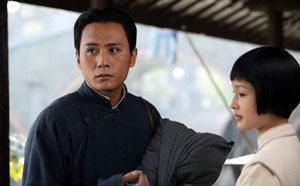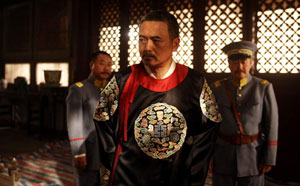|
|
|
|
|
|
|
|
Beginning of the Great Revival |
|
|
|
|
 
(left) Liu Ye and Li Qin, and (right) Chow Yun-Fat in Beginning of the Great Revival. |
|
|
AKA: |
The Founding of a Party |
|
|
|
AKA: |
The Birth of a Party |
|
|
|
Chinese: |
建黨偉業 |
|
|
|
Year: |
2011 |
|
|
|
Director: |
Han Sanping, Huang Jianxin
|
|
|
Writer: |
Dong Zhe, Guo Junli, Huang Xin |
|
|
Cast: |
Liu Ye, Chow
Yun-Fat, Andy
Lau Tak-Wah, Daniel Wu, Ma Shaohua, Chang Chen, Fan Bing-Bing, John
Woo, Aloys Chen, Li Qin,
Zhang
Hanyu, Chen Dao-Ming,
Zhao Benshan, Zhou Xun, Huang Lei, Tony Leung Ka-Fai, Ray Lui
Leung-Wai, Liao Fan, Alex Fong
Chung-Sun, Dong Jie, He Ping, Zhang Yishan, Huang Jue, Wang Danrong, Li Chen, Guo Tao, Fan Wei, Deng Chao, Huang Xuan, Qi Yuwu, Liu Yiwei, Angelababy, Bai Bing, Nie Yuan, Wang Xuebing, Zhou Jie, Wang Xueqi, Dong Xuan, Tan Kai, Zhang Yi, Tong Ruixin, Leehom Wang, Wang Bo-Chieh, Simon
Yam Tat-Wah, Nick Cheung Ka-Fai, Michelle Ye, Han Geng, Guo Xiao-Dong, Fan Zhibo, Yang Yang, Liu Yunlong, Wang Xinjun, Liu Wenzhi, Feng Gong, Li Jing, He Yunwei, Tao Zeru, Hou Yong, Zu Feng, Lin Shen, Shu Yaoxuan, Jiang Shan, Xie Mengwei, Fan Lei, Zhang Shan, Nie Weiping, Zhang Jiayi, Feng Yuanzheng, Du Chun, Guo Jinglin, Feng Danying, Xu Zheng, Che Yongli, Wang Luodan, Ren Zhong, Lin Yongjian, Tian Xiaojie, Liu Hua, Ma Jing, Liu Peiqi, Qin Lan, Xu Haiqiao, Aixinjueluo Qixing, Wang Yuexin, Yu Xiaoguang, Fan Xia, Qiu Muyuan, Tamia Liu, Chen Ran, Li Xuejian, Sam Chow, Hong Jiantao, Fu Xinbo, Myolie Wu, Zhou Yiwei, Baobeier, Vitas, Liu Jin, Pan Yueming,
Jiang Wu, Yang Yang, Ju Hao, Wang Kuirong, Zhao Liang, Guo Yongzhen, Miura Kenichi, Shen Junyi, Zheng Hao, Li Zefeng, Harrison Liu, Li Chengru, Han Sanping, Chen Guoxing, Ren Zhengbin, Li Xiang, Zhang Xilin, Dai Xu, Sergei Barkovsky |
|
| |
The
Skinny: |
Not much of a movie, Beginning of the Great Revival is nevertheless a must-see, thanks to its curious reframing of history plus the ironies inherent in its story and politics. If you're a card-carrying fan of the Chinese Communist Party, of course it's the bee's knees. If you're not, well, it's got lots of stars. |
|
|
|
|
|
|
Review
by Kozo: |
It's hard to look at The Beginning of the Great Revival without considering all the icky politics. Conceived as a celebratory film in honor of the 90th anniversary of the Chinese Communist Party (CCP), and a companion piece to 2009's The Founding of a Republic, Revival comes with bothersome circumstances that make impartial criticism difficult. Example: CCP has arranged for Revival to have a long run at cinemas free from competition with Hollywood heavyweights Transformers and Harry Potter. The government has even made discussion of the film inconvenient by meddling with user-review websites Douban and Mtime. Apparently, the Party wants everyone to see this film and to say nice things or nothing at all. If these circumstances don't raise the ire of an educated moviegoer and free-thinking human being, I don't know what does.
If one can suppress the urge to automatically dislike Revival, they might find that it actually works – for what little it is supposed to be. As a propaganda film, Revival's job is to impart information from largely one side. Duh, that side is the Communist Party, and Revival does its job gleefully and with surprisingly more panache than the entertaining but arduous series of meetings called Founding of a Republic. Those looking to reaffirm their admiration of the Communist Party should be happy with this Cliff's Notes version of history. There's still value, however, for those who aren't quite as fond of the CCP. Besides the obvious parade of star cameos and nitpicking over historical accuracy, the film offers a distinct and noticeable irony that makes this exercise in political self-fluffing into a potential CCP faceplant. The evidence is there if you look for it.
The story of Beginning of the Great Revival is merely an extended summary of early-twentieth century Chinese history told from the winning CCP side. The film recounts how the end of the Ching Dynasty and the [child] Emperor Puyi's reign led to internal turmoil in China, with acting president Yuan Shikai (Chow Yun-Fat) behaving dubiously in hopes of getting himself crowned as a new Emperor of China. Yuan's desire to return China to a monarchy directly conflicts with the teachings of Sun Yat-Sen (Ma Shaohua), leading to various factions struggling for control. Amidst this, scholars and concerned citizens, including a former soldier named Mao Tse-Tung (Liu Ye) form a new political party based on the teachings of German philosopher Karl Marx, with an assist from representatives of Russia's Vladimir Lenin. Presto: the CCP is born and decades of fighting, oppression, occasional singing and awesome red flag-waving will soon ensue. End credits roll!
Simplified and largely glib plot description aside, Beginning of the Great Revival zips through its historical checklist in a surprisingly engaging manner – at least initially. Stars both big and small appear, and many imbue their characters with more pathos than probably existed on the page. Also, the film dresses its set pieces in ways that resemble other, less didactic cinema genres. A tearful goodbye at a railway station between a general (Andy Lau) and his concubine (Angelababy) gets the Casablanca romantic noir treatment, while a rousing battle sequence has galloping horses and a heroic soldier (Liao Fan) triumphing against overwhelming odds. Other sequences echo thriller, espionage, horror and even Spielberg. The camera moves constantly, the music swells grandly – hell, there are even split screens. Split screens! It's a weird mix, and many details are totally bogus, but it seems that the Revival consortium of filmmakers tried hard to make this a fun propaganda movie.
Then the works gum up. Revival becomes a series of meetings and conversations, as individuals from all over China discuss the future of China, whereupon some of those individuals meet with other individuals so that the people who were once separately discussing the future of China can now discuss the future of China together. Oh the action-packed spectacle of it all. To be fair, these sequences are broken up by occasional tense or dangerous moments, and the conversations have both political and ideological value. Despite being told from one perspective, the film doesn’t demonize the opposing viewpoint embarrassingly. Unfortunately, following this fast-moving trip through history is not easy. Given the constant name-dropping and meeting room-jumping, you need either an open mind or pre-existing knowledge of the subject matter. Otherwise, the film alienates. Really, if you have no interest in Communism, Chinese history or the ethics of propaganda filmmaking, then stay away. Nobody asks Rob Zombie to watch the Care Bears Movie. Square pegs should stay away from round holes.
If you have a legitimate interest in China or its growing international notoriety then Beginning of the Great Revival is worth seeing, if only to debate the decisions, omissions and additions made by the filmmakers to their hoped-for stunning portrait of Communism. The parade of historical figures played by current stars is diverting and amusing (Former Super Junior member Han Geng as Deng Xiaoping? Wow!), and each is easily spotted since the film delivers onscreen titles announcing the appearance of each historical figure. One, however, doesn’t get identified. Chang Chen shows up early in the film as a Kuomingtang member who supports Sun Yat-Sen zealously, glowering in support and occasionally assassinating naysayers. It’s common knowledge that Chang is playing revered KMT figure Chiang Kai-Shek (the media bandied it about for weeks), but curiously, the film never identifies that that’s who he is.
The silent inclusion of Chiang Kai-Shek is one moment worth discussing, as is the film’s depiction of the May 4th Movement. Beginning with student protests in Beijing on May 4th, 1919, the movement marked a growing shift towards nationalism and the ascension of the working class. The student unrest and subsequent suppression on May 4th is presented as vital to the founding of the CCP, with the corrupt government essentially put on notice for its inability to truly help China and its people. Strangely, that sounds like another incident a good seventy years later in 1989, when a group of students also protested the government’s policies. Except that outcome was far bloodier and to this day that incident is largely swept under the rug by the CCP. The irony of a film extolling revolution from a country that now disallows the same is hard to ignore. How can the CCP endorse a movie with such an obvious parallel to its own, largely unacknowledged atrocities?
The above inference is drawn from an aware perspective, so it's possible that those who occupy the China version of flyover country will eat up this one-sided portrait of history as the absolute truth. If so, then good on the CCP: The Beginning of the Great Revival does its job. What it doesn't do is provide a motion picture that will convert the layman – and what it especially won't do is convince anyone looking at the film with even the slightest cocked eyebrow. Revival is really not a movie – it's a commercial for the Party intended to educate those who need reminding or those who really don't know very much at all. For the rest of us, it's either A) not for us, or B) something that we can debate, discuss and question because its content and its intentions are both fascinating. For Chinese cinema enthusiasts, The Beginning of the Great Revival is practically a must-see - just not for the reasons that the CCP wants. (Kozo, 2011) |
|
|
|
|
|
|
Availability: |
DVD (Hong Kong)
Region 3 NTSC
CN Entertainment Ltd.
2 DVD Set
16x9 Anamorphic Widescreen
Cantonese and Mandarin Language Tracks
Dolby Digital 5.1 / DTS 5.1
Removable English and Chinese Subtitles
*Also Available on Blu-ray Disc |
|
|
|
 |
|
|
|
image
credit: China Lion |
|
|
|
|
|
|
|
|
|
|
|
| LoveHKFilm.com
Copyright ©2002-2017 Ross Chen
|
|
|